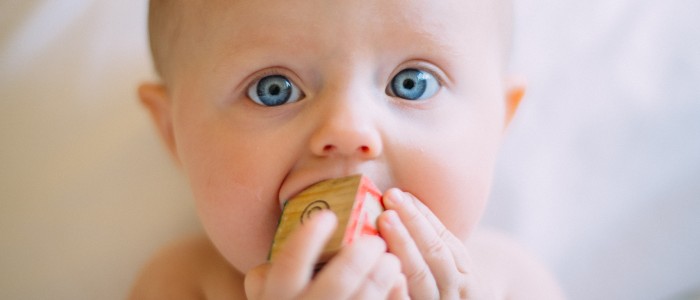When Should My Baby Start Going to the Dentist?

When your baby is first born, you frequently take them to the doctor for check-ups and exams to make sure they’re continuing to stay healthy. But one doctor you may forget to visit is the dentist, or our Hudsonville pediatric dentist to be specific. After all, babies aren’t born with any teeth, so why schedule an appointment? The truth is that oral healthcare starts early, even before your baby’s first tooth. Here’s a recommended timeline for your child’s dental health journey.
Caring for Your Baby’s Gums
Before you take your baby to see our pediatric dentist, you can start taking care of their gums at home.
Don’t bother going out and buying a toothbrush just yet — right now, there’s still nothing to brush. Instead, grab a soft, wet washcloth and gently wipe your twice a day. This will prevent bacteria from damaging your baby’s gums and, eventually, their teeth. Additionally, this will get your baby used to a twice-a-day oral hygiene routine.
Infant Oral Health Exams
You can take your baby to our dentist for their first exam after their first tooth erupts or their first birthday, whichever is sooner.
An infant oral health exam isn’t like a regular visit to the dentist. Instead of having your child sit in a dental chair, our pediatric dentist will conduct what’s called a “knee-to-knee” exam. You’ll sit facing our dentist with your knees touching, and your baby will be facing you on your lap with their legs wrapped around your waist. This way, your baby can lay their head on our dentist’s lap and get their exam while still being held and cared for by you.
Our pediatric dental team will do everything we can to make your baby’s first oral health exam as comfortable as possible. As your child’s parent or guardian, you’ll play a critical role in ensuring your child has a safe and positive first experience at the dentist. Your child can then see our dentist for a teeth cleaning every six months, which is also recommended for everyone else.
When to Start Brushing Teeth
You’ll want to start as soon as they come in. Using a wet toothbrush with a soft brush head, gently brush all sides of your baby’s teeth. You can use fluoride toothpaste if you wish, but only in the amount equivalent to a grain of rice.
Your baby will likely not have mastered spitting on command by the time their first tooth comes in. Because of this, you can help your baby by positioning their body in a way that allows any spit from brushing to dribble out of their mouth. As soon as they can spit on their own, encourage them to do so in the sink.
Around age 3, you can start using a pea-sized amount of fluoride toothpaste. Let your child start brushing their own teeth (still under your supervision) as soon as they are old enough to hold the brush. Most children can brush their teeth completely on their own around the time they start kindergarten or first grade.
When to Start Flossing Teeth
It can be such an uphill battle to get your child to brush their teeth twice a day that many parents forget about flossing altogether. However, you can start flossing your baby’s teeth as soon as two of them have erupted next to each other.
By flossing your baby’s teeth, you’ll be prepared to teach them how to floss on their own as soon as they are able, following a similar timeline to brushing: first, under your supervision as soon as they can use the floss, and then on their own.
Follow the steps below when flossing your child’s teeth:
- Use about 18 inches of floss to start.
- Wrap most of the floss around each clean middle finger leaving about two inches in between the two fingers.
- Tightly hold the unwound floss between your index fingers and thumbs.
- Move the floss between the teeth using a gentle rubbing motion.
- Curve the floss into a “C” shape once it reaches the gum line. It should hug one of your child’s teeth.
- Gently move the floss up and down against the tooth.
- Repeat steps 4-6 until you’re finished flossing all teeth that are touching each other.
Preparing to Lose Baby Teeth – Don’t Panic!
Just as your child starts brushing on their own, they’ll likely encounter a new dental experience: losing their first baby tooth. Children usually start around six or seven, and the process continues until they’re about 12 years old.
Losing baby teeth is a natural process, although it can be frightening for some children when it first happens. Make sure to prepare your child for what will occur when they start to lose their baby teeth. Consider celebrating the loss of your child’s baby teeth with visits from the tooth fairy to make the process more fun.
What’s not fun is losing a tooth due to an injury. If that’s the case, our emergency pediatric dentist is available after hours to treat your child.
Schedule an Appointment Today
Whether your baby needs their first oral health exam, or your child is due for their six-month cleaning, our Hudsonville, MI, pediatric dentist is here to help. Call Hudsonville Dental Kids today at (616) 209-4039 to schedule an appointment.
This blog post has been updated.
